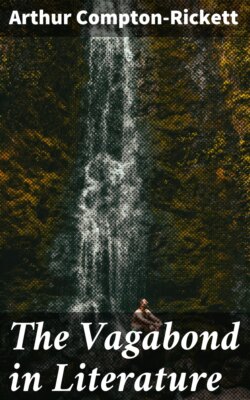Читать книгу The Vagabond in Literature - Arthur Compton-Rickett - Страница 5
На сайте Литреса книга снята с продажи.
I
ОглавлениеTable of Contents
There are some men born with a vagrant strain in the blood, an unsatiable inquisitiveness about the world beyond their doors. Natural revolutionaries they, with an ingrained distaste for the routine of ordinary life and the conventions of civilization. The average common-sense Englishman distrusts the Vagabond for his want of sympathy with established law and order. Eccentricity and unconventionality smack to him always of moral obliquity. And thus it is that the literary Vagabond is looked at askance. One is reminded of Mr. Pecksniff: “Pagan, I regret to state,” observed that gentleman of the Sirens on one occasion. Unhappily no one pointed out to this apostle of purity that the naughtiness of the Sirens was not necessarily connected with paganism, and that the siren disposition has been found even “in choirs and places where they sing.”
Restlessness, then, is one of the notes of the Vagabond temperament.
Sometimes the Vagabond is a physical, sometimes only an intellectual wanderer; but in any case there is about him something of the primal wildness of the woods and hills.
Thus it is we find in the same spiritual brotherhood men so different in genius and character as Hazlitt, De Quincey, Thoreau, Whitman, Borrow, Jefferies, Stevenson.
Thoreau turned his back on civilization, and found a new joy of living in the woods at Maine. ’Tis the Open Road that inspired Whitman with his rude, melodic chants. Not the ways of men and women, but the flaunting “pageant of summer” unlocked the floodgates of Jefferies’ heart. Hazlitt was never so gay, never wrote of books with such relish, as when he was recounting a country walk. There are few more beautiful passages than those where he describes the time when he walked between Wrexham and Llangollen, his imagination aglow with some lines of Coleridge. De Quincey loved the shiftless, nomadic life, and gloried in uncertainties and peradventures. A wandering, open-air life was absolutely indispensable to Borrow’s happiness; and Stevenson had a schoolboy’s delight in the make-believe of Romance.
